|
lick pictures for a larger version.
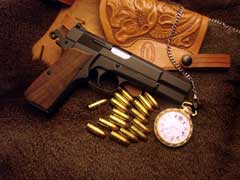
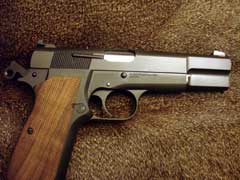
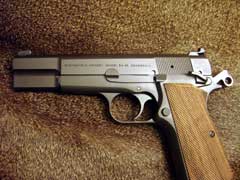
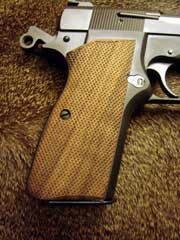
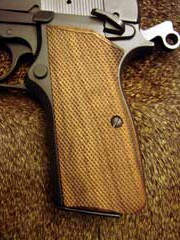
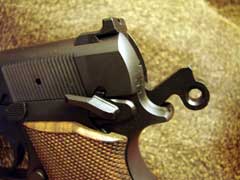
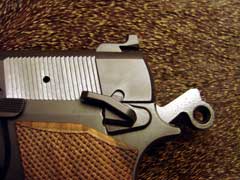
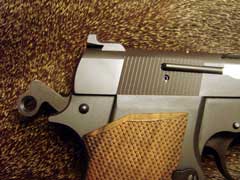
Extended thumb safety lever.
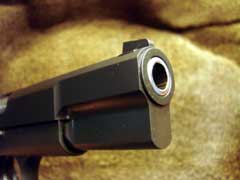
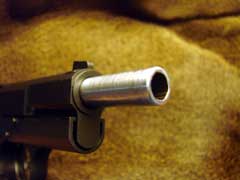
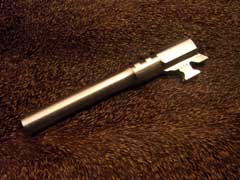
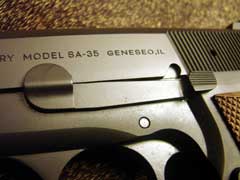
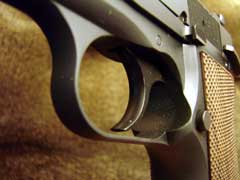
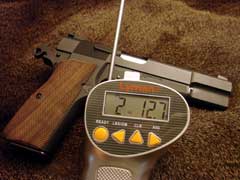
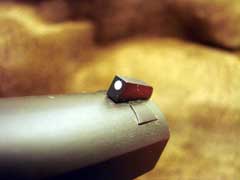
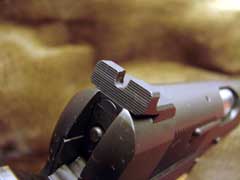
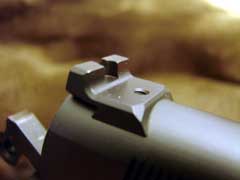
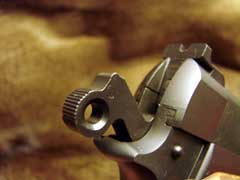
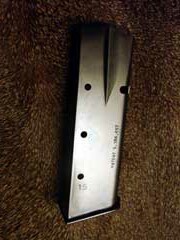
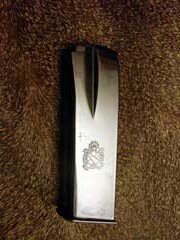
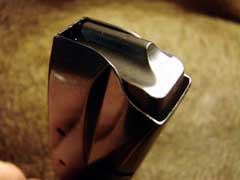
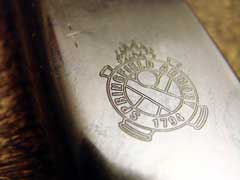
Springfield Armory redesigned the FN Hi Power's
13-round magazine to hold 15 rounds. Magazines are interchangeable
between the Hi Power and the SA-35.
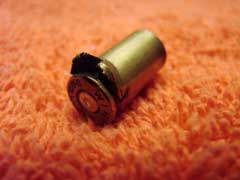
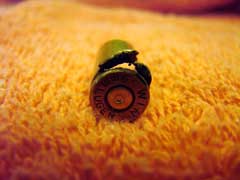
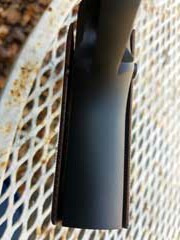
Author experienced two catastrophic case failures using
commercial remanufactured ammunition - the second of the two
is shown above (top and center). No damage resulted to the
pistol or the shooter, but the gases did blow the undamaged
grip panels away from the front of the grip frame (bottom).
The SA-35 proved to be tough enough to take it.
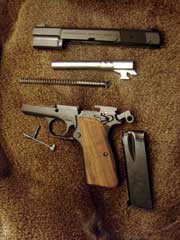
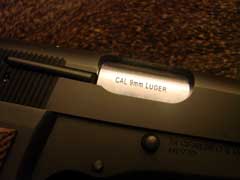
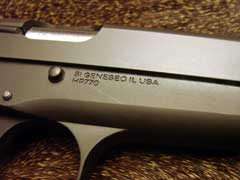
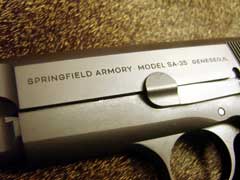
|
|
When
the French military decided in 1923 to adopt a new sidearm,
Fabrique Nationale (FN) decided to pursue the contract. In turn,
FN turned to an American gun designer with whom they had already
enjoyed a long and fruitful relationship: John Moses Browning.
By this time, Browning had already established himself as the
greatest firearms designer who ever lived, having spawned a
staggering number and variety of advanced sporting and military
arms which are still unparalleled over a century after their
introductions. Many of these famous designs had been sold
outright to Colt and Winchester, but Browning's relationships
with those companies had soured by the turn of the 20th century
due to the companies' refusal to assign royalties to Browning
rather than pay a flat fee for the designs. FN was more than
willing to pay Browning's desired royalties, and had eagerly
sought to produce the Utah genius' designs.
Development
of the FN pistol was no easy task, as the French had high
expectations for their new sidearm: it had to be compact,
rugged, dependable, powerful, safe, possessed of a high magazine
capacity, and simple enough for the average soldier to service
in the field. Further complicating the pistol's development,
Browning had sold the rights to his landmark 1911 pistol design
to Colt, so an entirely new pistol had to be designed from the
ground up in order to avoid violating the earlier patents.
Browning got to work on the new design, and filed the U.S.
patent for his new pistol in 1923 (the patent was approved in
1927, after Browning's death).
Browning
died in 1926, before completing the pistol's final design, and
FN designer Dieudonné Saive completed the design, making
significant changes to it. Browning's new design included an
all-new locking mechanism, and Saive contributed a revolutionary
staggered-feed "double stack" magazine that allowed
for greater magazine capacity than earlier designs; these
innovations remain the standard in today's modern pistol
designs, almost a century later. Among Browning's innovations
which did not find their way into the final version of the
pistol was a striker firing mechanism, which would finally
become popular over 50 years after Browning's death.
France
did not adopt the final version of the pistol (which they called
the "Grand Puissance", which translates to "Great
Power" or "High Power"), leaving Belgium as the
first to adopt the P-35, better known as the High Power, in
1935. Germany overran Belgium in 1940, taking over FN's Herstal
plant, but both design and designer were smuggled out in time,
and the pistol resumed Free-World production at the John Inglis
Co. in Toronto, Canada, where it became known as the "Hi
Power".
After
the War, the Hi Power resumed production at FN's Herstal plant
(among other locations) and was commercially introduced to the
U.S. market in 1954 under the Browning Arms Co. name, which was
owned by FN's parent company. FN Hi Power production continued
until 2018, when the Hi Power was finally dropped by FN /
Browning, much to the disappointment of those of us who love the
Hi Power design.
Since
that time there have been a few cheap imported Hi Power
knock-offs available, but these often failed to hit the mark in
many ways. One could still get FN Hi Powers on the used
market, but collector value on these has skyrocketed, beginning
even before their discontinuation. Other than that, the only way
to get a nice Hi Power has been to have one custom-made by one
of a very few shops offering the model (such as Nighthawk
Custom, who recently ceased production of their exquisite Hi
Power), but these best-quality custom Hi Power pistols are
beyond the financial reach of the vast majority of shooters.
There has just been absolutely no way for the ordinary shooter
to get a really nice quality, American made Hi Power pistol.
Until
now.
Springfield Armory recently released their SA-35 9mm pistol, and
it is a DANDY. One Hundred Percent made in the U.S.A., the SA-35
is a Hi Power through and through, with significant improvements
that number it among the finest production Hi Power pistols ever
made, and at a very affordable price.
Since
I mentioned price, let's get that out of the way right now: the
Springfield SA-35 9mm pistol's MSRP is only $699 US, which is an
amazing value for an American-made Hi Power.
The
SA-35's slide and receiver are crafted from forged steel,
lending great strength to the pistol - more on this later. The
pistol is finished in a very attractive matte blue, resulting in
a very beautiful, traditionally understated appearance. The
SA-35 is not as shiny as my early-1980s FN Browning Hi Power,
but its more restrained matte blue yields a very tough and
elegant beauty. Adding to the SA-35's traditional beauty is a
quality set of top-bordered fully-checkered walnut grips. While
the SA-35 looks very traditionally Hi-Power, Springfield Armory
has made some significant changes that make the SA-35 an even
better pistol than its Belgian parent. I will discuss some of
these improvements:
When
the Hi Power was developed, the only type of ammunition
available used round-nose solid bullets, which functioned just
fine with the Hi Power's innovative integral feed ramp. The
SA-35's cold hammer-forged barrel features an improved integral
feed ramp design, making the SA-35 much more reliable using the
wide variety of bullet profiles seen in modern ammunition. I
have experienced absolutely no function problems in my SA-35,
using a variety of ammunition types...except two, which were
obviously no fault of the pistol...
Early
on in my preliminary shooting tests, I experienced a case
blowout using remanufactured 115-grain JHP ammo. Once I
ascertained that there was no injury to the gun or the shooter,
I was quite impressed with the SA-35's ability to absorb such a
catastrophic failure and still keep running. It should be
mentioned that I have used this particular brand of
remanufactured ammo (Stryker 115-grain JHP from The
American Marksman) for many years, and have never
encountered any problem with it. Later on, while I was shooting
on video using the same box of ammo, I again experienced an
identical case blowout (this can be seen in my video at the 4:17
mark). Again, the SA-35 was strong enough to absorb the
failure, with no injury to the shooter or the pistol; the front
edges of the grips were blown-out, but there was no damage done
to the grips or the grip screws, so all I had to do was clean
the powder residue from the inside of the pistol and re-install
the grips, and I was back in business. Inspection of the
retrieved case revealed that one whole side of the case head had
separated, the side of the case was blown out, and the primer
was heavily cratered, possibly indicating a double powder
charge, but I had perceived no difference in felt recoil upon
firing the offending rounds. Regardless, I will not be using any
more of that lot of ammo (although I will continue to
confidently enjoy Stryker ammo from different lots), and the
SA-35 proved more than a match for such failures, continuing to
perform flawlessly with +P and +P+ loads from other makers.
The magazine design of the Hi Power allowed
for a thirteen-round capacity, and was revolutionary for its
time as the first "high-capacity" pistol magazine.
Springfield Armory's engineers redesigned the magazine's
internals to allow their magazine, of the same size as the
originals, to hold two extra rounds, bringing magazine capacity
up to fifteen rounds. As nice as the original thirteen-round
design was, "the more the merrier"; the SA's
fifteen-round capacity is a welcome improvement. As an added
bonus, the Hi Power's thirteen-round magazines function
perfectly in the SA-35, and vice versa; so if you have a bunch
of thirteen-round Hi Power magazines lying about, you can use
them in the SA-35, and fifteen-round SA-35 magazines (which
are available online at the Springfield Armory Store) can be
used to update your Hi Power pistol's capacity. The SA-35's
purchase price includes one magazine, but again, extras can be
purchased reasonably from Springfield Armory.
Another nice touch relating to the magazine
is that the SA-35 features a beveled magazine well. Beveled mag
wells are often seen as a custom feature of high-end 1911
pistols, and really help with quick magazine changes. The Hi
Power magazine design already tapers at the top, so finding the
mag well is easier than on a 1911, but the SA-35's beveled mag
well really helps guide the magazine home.
One
of the truly great improvements that Springfield Armory made to
the Hi Power design is that the Hi Power's magazine disconnect
has thankfully been jettisoned. The magazine disconnect was a
requirement of the French military for the original Hi Power: a
magazine disconnect is a "feature" that prevents the
pistol from firing when the magazine is removed, effectively
disabling the pistol if there is no magazine present. Deletion
of the magazine disconnect also allows the SA-35's magazine to
drop free of the pistol when the magazine release is depressed.
The Hi Power design drops the magazine only a fraction of an
inch, and retains it in the pistol to be snatched free by the
shooter for magazine changes; this may be arguably desirable in
a military setting, where cost and availability of magazines in
the field might be problematic, but it costs a couple of
precious seconds to accomplish in many civilian self-defense
situations, when those couple of seconds are all that matter.
Another
great virtue of Springfield Armory's deletion of the magazine
disconnect is that the disconnect interfered with achieving a
good trigger pull. The Hi Power design is a Single-Action
trigger, meaning that the hammer must first be cocked before the
trigger can release the hammer, rather than a Double-Action
design where the trigger performs the dual purpose of cocking
and releasing the hammer. The Hi Power's magazine disconnect
drags on the trigger, resulting in a rough and heavy trigger;
many custom gunsmiths through the decades have deleted the
magazine disconnect for that reason, and it is not hard to do,
but with the SA-35 there is no need. Because of this, the SA-35
has a much better trigger pull than any factory Hi Power
trigger. While my unaltered FN Browning Hi Power has a gritty
trigger pull of over six pounds, this SA-35 has a smooth and
crisp trigger pull that measures just 2 pounds, 12.7 ounces on
my Lyman
Digital Trigger Pull Gauge. Springfield Armory claims that
the SA-35 triggers are tuned at the factory, and I believe them;
this trigger is nothing short of superb.
The
sights on the SA-35 are a significant improvement over those of
the basic Hi Power. While the FN version typically sported
GI-style sights consisting of a dovetailed notch rear sight with
a rounded post front sight that is notoriously hard to acquire
in all but ideal lighting conditions, the SA-35 features a much
more modern sighting system. The SA-35's front sight is a
clearly-defined drift-adjustable post with an almost vertical
rear face and a white dot in the center; this makes the
all-important front sight much easier to acquire. The white dot
is very quick in lower lighting conditions, while the rear face
of the sight radically reduces glare from bright sunlight. The
rear sight on the SA-35 is also drift-adjustable, is deeply
serrated to eliminate glare, and has a U-shaped notch that
perfectly nestles the front dot. The rear sight is also a
"Tactical Rack" design, which allows the slide to be
manipulated with one hand against a wall corner or table should
the shooter's support hand become disabled.
The
Hi Power's thumb safety operates in a manner which will be
familiar to those who are accustomed to the 1911's operation:
the safety flips up for SAFE and down for FIRE, and is well located
to fall under a right-handed shooter's thumb. The only problem
with the standard Hi Power's safety lever is that it is small
and hard to engage, especially when flipping it to the SAFE
position. Springfield Armory fixed this problem on the SA-35 by
simply contouring and extending the safety lever as is often
seen on 1911 pistols, just enough so that the safety is easy and
quick to operate, without being so large as to get in the way.
The safety positively clicks into the SAFE and FIRE positions,
and is set-up at this time for right-handed shooters only.
Another
problem commonly encountered with the Hi Power, especially by
large-handed shooters such as myself, is that the web of the
hand can very easily be pinched between the frame beavertail and
the hammer spur upon firing, which can be quite painful. The
SA-35 features a rounded rowel-type hammer, which is easy to
operate but does not extend far enough rearward to cause this
problem; again, this is an issue commonly addressed by custom
gunsmiths that Springfield Armory has taken care of right out of
the box.
As
can be plainly seen, the Springfield Armory SA-35 packs a lot of
value into its $699.00 suggested retail price tag.
Specifications - Springfield Armory SA-35™ 9mm Semi-Automatic Pistol
| Model # |
HP9201 |
| Caliber |
9mm (Luger, Parabellum) |
| Action |
Semi-Automatic, Single-Action |
| Slide |
Forged Carbon Steel, Matte Blue Finish |
| Frame |
Forged Carbon Steel, Matte Blue Finish |
| Barrel |
4.7 Inch, Cold Hammer Forged, 1:10 Twist, Redesigned Feed Ramp |
| Recoil System |
SA-35™ Recoil Spring & Guide Rod |
| Hammer |
Recontoured, Rowel-Type |
| Thumb Safety |
Right-Hand, Extended |
| Magazine Well |
Beveled |
| Overall
Height |
4.8 Inches |
| Overall
Length |
7.8 Inches |
| Weight,
Unloaded |
31.5 Ounces |
| Trigger |
Factory Tuned, Average Pull Weight 2 Pounds, 12.7 Ounces |
| Front Sight |
White Dot, Drift-Adjustable for Windage |
| Rear Sight |
Serrated Tactical Rack, Drift-Adjustable for Windage |
| Grips |
Checkered Walnut |
| Magazine
Capacity |
15 Rounds |
| Magazines
Included |
1 |
| MSRP as of
December 2021 |
$699.00 US |
As befits any fine pistol, a fine holster
system is in order. There are a great many holster options
already available for the Hi Power pistol, and of course any of
these would be perfect for the SA-35. Hi Power holsters can be
had from pretty much any holster maker, and Springfield Armory
currently offers both
leather and Kydex holsters, as well as the aforementioned magazines
and Crimson
Trace Lasergrips for the SA-35, in their online store. Also,
if one does not have a holster made for the Hi Power, most of us
have at least one holster rig made for a 1911 pistol, and these
can be pressed into service for the SA-35. I have tried a
variety of leather holsters for fit, including holsters that are
closely molded to the 1911, and they all work just fine; I am
not sure whether Kydex 1911 holsters will work for the SA-35, as
I don't own any, my preference being for leather.
One of my favorite 1911 rigs is the
"Tanker" holster made by my good friend Rob Leahy at Simply
Rugged Holsters in Prescott, AZ. This holster is Rob's
version of the venerable WWII-era Tanker chest rig, as worn by
some armored crewmen. The Tanker rig can be anchored to a belt
or worn without a belt, and offers quick and easy access to the
pistol while keeping the hands free for other work. My Simply
Rugged Tanker is beautifully hand-carved by Richard Gittlein,
and is a practical work of art. The Tanker rig is not listed on
Simply Rugged's web site, but if you ask Rob nicely and tell him
I sent you, I imagine he would make one for you.
With their superb SA-35, Springfield Armory
offers a legendary pistol design, updated for the 21st Century,
at a price any shooter can afford. The SA-35 is rugged,
reliable, powerful, practical, accurate, beautiful, and made in
the U.S.A. I cannot recommend it emphatically enough.
Springfield Armory: www.springfield-armory.com.
www.springfield-armory.com/sa-35-series-handguns/sa-35-handguns/
To Find a Springfield Armory Dealer Near You, Click on the DEALER FINDER at Lipsey's:
www.lipseys.com.
To Order Springfield Armory Products Online, Click on the GUN GENIE at Davidson's Gallery of Guns:
www.galleryofguns.com.
Order Ammo Online at Lucky Gunner: www.luckygunner.com.
Buffalo Bore Ammo: www.buffalobore.com.
Double Tap Ammo: www.doubletapammo.com.
Simply Rugged Holsters: www.simplyrugged.com.
Crimson Trace: www.crimsontrace.com.
Lyman Products: www.lymanproducts.com.
Boge Quinn
  
Got something to say about this article?
Want to agree (or disagree) with it? Click the following link to
go to the GUNBlast Feedback Page.
|
|
Click pictures for a larger version.
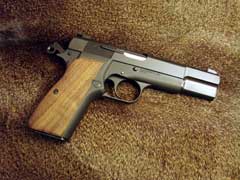
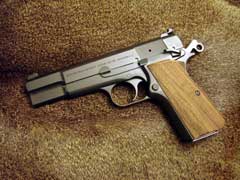
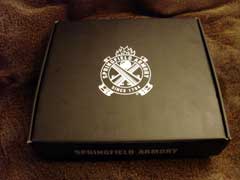
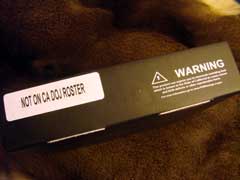
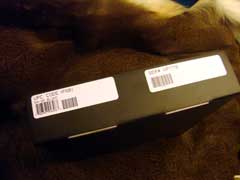
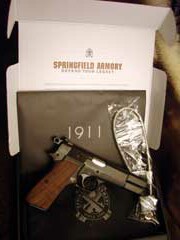
Springfield Armory SA-35 comes with box, manual (this
one cvame with a 1911 manual), cable lock, and one 15-round
magazine.
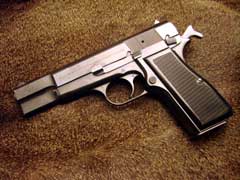
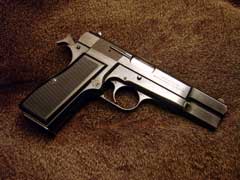
Original 1980s-vintage FN Browning Hi Power.
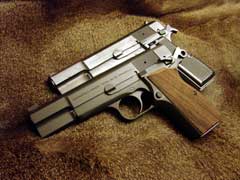
FN Browning Hi Power (top), Springfield Armory SA-35
(bottom).
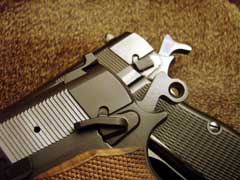
Comparison of thumb safeties: FN Browning Hi Power
(top), Springfield Armory SA-35 (bottom).
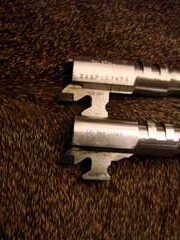
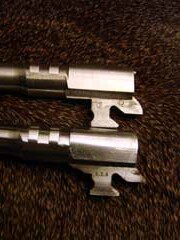
Comparison of feed ramps: FN Browning Hi Power (top),
Springfield Armory SA-35 (bottom).
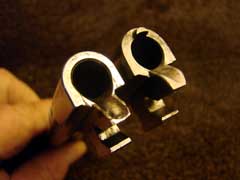
Comparison of feed ramps: Springfield Armory SA-35
(left), FN Browning Hi Power (right).
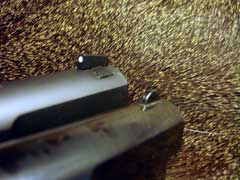
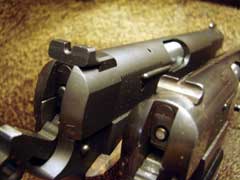
Comparison of sights: Springfield Armory SA-35 (left),
FN Browning Hi Power (right).
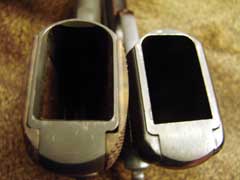
Comparison of magazine wells: Springfield Armory SA-35
(left), FN Browning Hi Power (right).
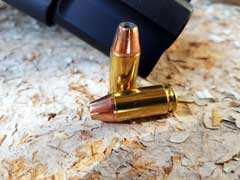
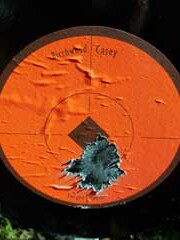
Buffalo Bore Standard Pressure 115-grain JHP is now
available in bulk packs for increased savings.
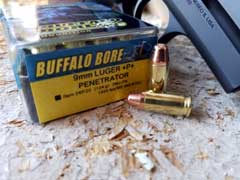
Buffalo Bore +P+ Penetrator 124-grain FMJ Flat Nose.
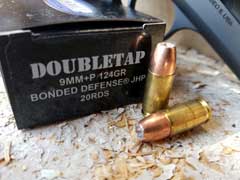
Double Tap 124-grain +P Bonded Defense® JHP.
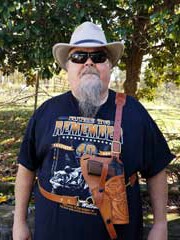
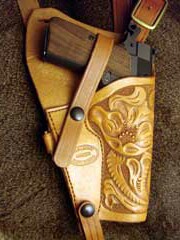
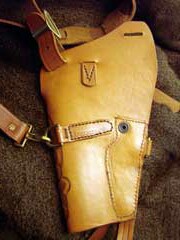
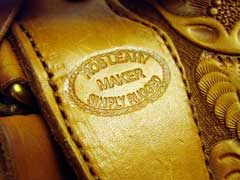
Simply Rugged Holsters 1911 Tanker rig.
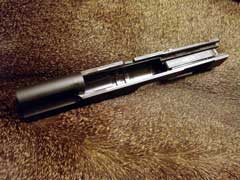
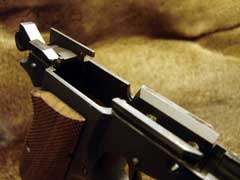
|
![]()